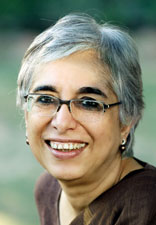Manju Kapur is quite happy to be dubbed a ‘chronicler of Indian families,’ but do feel free to choose any label that will float your boat. “My own feeling is, describe me any way you like, as long as I am relevant, as long as I am read, I don’t really care,” she says.
The Indian author’s first novel ‘Difficult Daughters’ (1998), won her the Commonwealth Prize for First Novel (Eurasia Section) and went on to become a bestseller in her homeland. She followed her debut with four other novels. ‘A Married Woman’ (2003), ‘Immigrant’ (2009) and ‘Custody’ (2011), all of which featured women protagonists caught up in personal tumult and on the brink of profound change.
In ‘Home’ (2006), it was an entire family. When the owners of Banwari Lal Cloth Shop find their traditional business threatened by the increasing popularity of jeans and pre-stitched salwar kameezes they must find new ways to survive.
“Families reflect all of society – social mores, cultural trends, gender relations, class equations – all of them are seen brilliantly in the novel,” says Manju, professing her love of the form. The novel appeals to her not only as a writer, but as a teacher as well.
She says she’s looking forward to visiting Sri Lanka in part because some of her favourite students were Sri Lankan – she remembers them as sources of “consistent pedagogic pleasure.” “I am aware we saw the best (many were here on scholarships) but the best was very impressive indeed. Since then I have always been curious about the country,” writes Manju.
She is currently at work on a new novel – one in which she describes as having more male characters and being more “small town and village.” “The whole thing is proving to be a challenge and I bang my head against it day and night. I am ashamed to reveal how much time I spend actually avoiding it – yet this is something I really want to write, so there is no question of moving on. I must finish it and finish it to my satisfaction. When this is going to be, I don’t know, the deadline keeps shifting.”
What are you reading now?
Are you enjoying it?
A biography of Ibsen by Michael Meyer. At present I am tutoring an Ibsen play and I find one of the best ways of getting into a writer is through their lives. In general I enjoy reading biographies, particularly of writers and the more tortured the life, the more impressed I am.
Where do you most like to read?
In my room, at night, after dinner, when the day’s work is done, and the hours stretch out, there I am with my book on my sofa, or when I can’t sleep, in bed reading till morning.
Do you still teach? As a professor of English, what are/were some of the texts you most enjoyed introducing your students to?
Alas, I no longer teach. I resigned two years ago, when it became impossible to write and teach at the same time. [The system changed] I most enjoyed teaching novels, partly because novels were something the students had no problem relating to – for example you can make Jane Austen relevant to a middle class Indian student, while Spenser and Swift are a bit more difficult.
I liked novels in spite [and not because] of my own novel writing. To my surprise I found that writing the stuff helped not at all when it came to the teaching of it. Writing and teaching were two completely different enterprises. One involved staring blankly at the computer for half the day, the other involved grand statements about text, society, gender, patriarchy, power, etc etc.
When occasionally an essay on my work comes my way I am startled by the connections I am supposed to have made, the truths I am supposed to have revealed. There is a short story of mine on the BA Pass syllabus [Delhi University] that I successfully avoided during all my teaching years.
Your first novel, ‘Difficult Daughters’, received the 1999 Commonwealth Award for the Eurasian region – do you remember who you counted amongst your competition that year? Of the books that have received the award, could you share some of your favourites?
The award initially took me by surprise, I didn’t even know I was in the running. But I do remember Kerri Sakamoto, she was the one who won the overall award for The Electrical Field. Murray Bail won the prize for best novel, [Eucalyptus] I remember that, because he had to be dragged over from Australia to New Zealand, he seemed to dislike intensely the public aspects of writing. I think most writers feel a somewhat similar ambivalence.
Favourite award winners?
Well for starters, In Other Rooms Other Wonders by Daniyal Mueenuddin, Unaccustomed Earth by Jhumpa Lahiri, Small Island, Andrea Levy, On Beauty, Zadie Smith, The Pickup, Nadine Gordimer, Atonement, Ian McEwan, Too Many Men, Lily Brett,
As a writer, what is it like to take on something as monumental and emotionally weighted as the Partition? If you could choose a book to recommend to someone who wanted to know more, which would you suggest?
It was very difficult to tackle the Partition. No words could do its horror justice, and yet words were needed. I tried to introduce Partition in many ways but everything I wrote seemed to trivialise it. Eventually I felt that to use the words of those I interviewed was the best way. I used memories, single and collective, to tackle the incident obliquely. Partition is still a very raw subject, those who lived through it were reluctant to talk, yet they also felt their experiences should not be lost.
I found Ashok Bhalla’s three volume collection of stories related to Partition very moving. The trauma and the pain of that time comes through despite the bad translations. |


